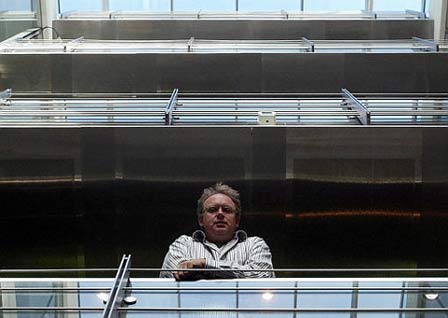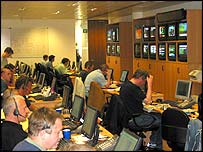 |
In 1999, Briton Andrew Black was making a decent enough living as a professional gambler, concentrating mainly on playing bridge and betting on horses. But he was dissatisfied with traditional bookmakers. By the time they build in their margins, says Black, 41, "you've got to be 20% smarter to make money. And if [you] make a mistake, [you] can't trade out of it. I thought, There's got to be a better way."
So he made a better way by co-founding London-based Betfair, the peer-to-peer cybercasino that's done for gambling what eBay did for garage sales. On Betfair, there's no "house": the site's 250,000 registered customers simply post their bets and wait for someone to take them on. Betfair charges a commission on each winning bet; the more you bet, the lower the commission. When the site launched in 2000 with $1.8 million raised from Black's and co-founder Ed Wray's network of contacts, it was taking less than $90,000 a week in bets; now that figure stands in excess of $90 million a week in matched bets, about 13% of the estimated $35 billion global annual online sports-betting industry. From April 2002 to April 2003, Betfair's pretax profits rose from $1.9 million to $15.5 million. The site has registered users in 85 countries: 70% of their bets are placed on horse races. And if a company can judge its success by the number of people it's upsetting, then Betfair is thriving. The U.K.'s traditional bookmakers are still hugely profitable, but they're grumbling because Betfair permits users to "lay" bets (to back a horse, competitor or team to lose rather than win). Some charge the practice encourages corruption. Says Graham Sharpe, spokesman for old-style bookies William Hill, "If you have a bet on an exchange, you don't know who it's with; if [the person] is offering extravagant odds, you don't know why."
Black counters that his site actually makes strange betting patterns easier to identify. He points out that Betfair has signed agreements with, among others, the Jockey Club in Britain and the English Football Association, promising to inform them of any suspicious wagers. And last month the British government said it didn't think it was necessary to license or regulate those who lay bets to the chagrin of traditional bookmakers, which had been pushing for such a move.
 |
A big man, Black ambles around Betfair's offices in shorts and a fleece. In his spare time, Black still likes to gamble and the next wager he'll need to make is when to take Betfair public, something Black insists won't happen for at least 18 months. "We've got to knock the company into shape," he says. "We want to get the timing right." It's the biggest bet of all, and not something even a seasoned gambler would take lightly.
It was the model for Perfect Competition that was the initial inspiration. This theory tends to crop up early in economics textbooks, to be followed by many hundreds of pages detailing the circumstances when it will not apply (monopoly, barriers to entry, imperfect knowledge, etc, etc). Yet it remains beguiling. It is an economics system that allows everyone an equal chance and promises a life that can be fair to all. Andrew Black, creator of Betfair, the betting exchange that has transformed a whole industry, is sitting in a cramped office. He has a reputation for dishevelment, being one of few people to have turned up for conferences with silks in the Temple wearing corduroy shorts. He is relatively tidily dressed but one senses immediately there isn't really much thinking time to spare for mundane fripperies such as 'What socks shall I wear today?'
'The idea just came to me sitting in a room in a farmhouse in Gloucestershire,' says Black. 'It goes back to when I did economics and there must have been one lesson talking about Perfect Competition which hit me in a big way.'
He had pursued a variety of careers:
And so on through the alphabet taking in billets as various as caddying and working for the Ministry of Defence at GCHQ.
Black, 41, who readily admits to being 'hooked on thinking, mental roughage', then had an idea. It was based on the nearest thing he had seen, during his diverse employments, to the concept of Perfect Competition - the New York Stock Exchange. 'With the FTSE there are a lot of brokers who just put their prices up,' he explains. 'In New York you ring your broker and say "I want to buy" and he'll go and just stick your bid on the board. Anyone can come and post their bid on the board, which creates a great big matching system. There is almost a beauty to a really efficient industry.'
His moment of genius was to match that model to the business of betting on horses, an inefficient industry that he knew very well. It is one thing to be inspired but at some stage you have to get off your chair and put in the perspiration. The motivation came from the sudden death of his father, which was a second family tragedy following the death of his elder brother from a brain tumour shortly after Black had been thrown out of Exeter University for spending more time studying form than books.
'My father was much cleverer than me, he genuinely was,' says Black. 'He was just an amazing mathematician. A very quiet, very happy man.' And a sometimes successful entrepreneur. 'He was a member of the Round Table,' says Black, 'and one year was made chairman. Each year they had a charity event and he thought he'd do something a bit special and he had a really good idea: to hire out Wembley Arena and get all the top black music stars to perform.' It was so successful his father repeated the trick nine months later.
'And Desmond Decker invited him on stage and said, "I'd like to introduce you to the man who put it all together, can we have a big round of applause for Mr Black." And he was the only white person in the whole arena.'
Black Senior's career as an events organiser ended with him losing all his money. His death 'absolutely stunned me. I can remember I sat in a chair for three days. I got up, had some breakfast, sat in a chair, stared out of the window, got up, had some breakfast, sat in the chair again. Then I settled down to write a really long speech to read at his funeral. He was a rock. Whatever stupid thing I'd done he would bail me out. I loved making him laugh. He was a great friend.'
 |
Even though Black was 'on the best money of my life' he resigned from the Ministry of Defence. 'I had to do this betting thing now.' He joined up with a friend of his brother, Ed Wray. 'Ed and I spent about six months fleshing out the business plan. I was working on the website, he was working on the legals and financials. Then we started seeing the venture capitalists one by one and, even though we were getting to the height of the dotcom boom, it was very difficult to make them understand my vision. The biggest problem was that flutter.com had hoovered up all the venture capital that was out there. Venture capitalists all like to back the same one.
'I could sense at the time that the internet would be a space filled by a series of players who totally own the space they are existing within. There is one pre-eminent auction house - Ebay. There is one pre-eminent search engine - Google. It's perhaps not the same in retailing but there's Amazon. 'Flutter sold themselves very well. Here's Ebay, it's massively successful. Everyone wants something like it. We will be the Ebay of betting. It turned out to be a fairly compelling story for venture capitalists. Ours didn't look like anything you've seen in your life before. There was nothing that looked like or smelled like Betfair.'
Discouraged by people who are paid handsomely to invest in start-up companies, Black and Wray turned to friends. When cajoling money from mates, timing and your audience is everything. 'It was mostly Ed's mates. He'd been earning a whacking great salary at JP Morgan and they'd all had these obscene bonuses. So we went and hoovered up all of that. "What is it? Yeah, yeah, stick me down for 50K" and promptly forget what they'd seen. They had so much money they just wanted to find a home for it.
'We raised a million. It felt like a lot of money but we found people were quite expensive. We had a very, very small team.'
On the plus side: 'The one thing I had convinced myself of was that it was a rock-solid proposition which I had examined from every angle.' Chief among his innovations was to devise a code capable of recognising mutually exclusive outcomes. 'With Flutter if you laid three horses to lose £500 in the same race you'd have to stump up £1,500. With us it was £500. You have to give people the ability to spend the maximum available with their funds.'
Even so, the million did not last long. 'We had a few clients. About 10 a day. I was absolutely thrilled. I can remember all their names.' Betfair needed exposure and came up with a death-of-a-bookie campaign, featuring an actor in a coffin, 'which was actually quite distasteful but it made the front page of The Sunday Times business section'.
In poor taste, maybe, but definitely prescient. Betting exchanges have so transformed the industry that many of the high-street monoliths may be forced to join them rather than continue railing against them. By creating a vehicle whereby you can make a profit without taking a hefty percentage, Black had hit at their core. 'One of the great things about Betfair was that it was just the most disruptive idea imaginable to the betting industry. It drove a cart and horses through the whole bloody lot of it. And quite right, too. We came along with a better mouse trap. They could have done it themselves.'
Or they could have deflected Black by offering him a job. 'I went to see Ladbrokes, we didn't get on. They didn't like me because I was too posh. Same with Hills.' In fact, only his father's side of the family was wealthy. 'My mother was working class, her father was a shop steward. I admired them equally. 'Most people in life have a sense of existing in some stratum of society. I didn't. There is a lot of classism, I see it around me and I really hate it.''
The secret of Betfair's success was 'a really sweet product'. 'Ours was a very well designed betting tool targeting the guy who knows what's what. Everything was crystal clear. I'd had plenty of time to chew it over. And I'm a good thinker.'
Competitors appeared but too hurriedly. They tried to clasp the dying embers of the dotcom boom but in their haste they hadn't put in the thinking hours. Meanwhile, their major competitor, Flutter, which had enjoyed colossal advantages in terms of manpower and funding, was forced to merge with Betfair on very favourable terms to the underdog. Betfair owns more than 90 per cent of an extremely profitable market that has startling growth prospects.
Black's own fortune has grown exponentially and may move into the hundred-million bracket should his company be launched successfully on the Stock Exchange. The man who was inspired by the concept of Perfect Competition is very close to presiding over a monopoly.
Please do not copy/paste this content without permission. If you want to use any of it on your website contact us via email at ![]() traderATfinancial-spread-betting.com (remove the AT and substitute by @).
traderATfinancial-spread-betting.com (remove the AT and substitute by @).